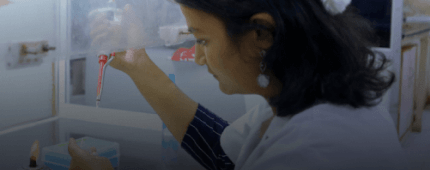B.Pharm. Pharmacy
- Home
- Medicine & Health Sciences
- SRM College of Pharmacy
- B.Pharm. Pharmacy
Campus
Kattankulathur (KTR)
Sanctioned Intake
100
Annual Fees
INR 2,25,000
Duration
4 Years
About the Programme
Eligibility for B.Pharm. Pharmacy
1. Candidate shall have passed 10+2 examination conducted by the respective state/central government authorities recognized as equivalent to 10+2 examination by the Association of Indian Universities (AIU) with English as one of the subjects and Physics, Chemistry, Mathematics (P.C.M) and or Biology (P.C.B /P.C.M.B.) as optional subjects individually.
2. Minimum of 50% aggregate of marks in PCM/PCB
3. Candidates who have passed D.Pharm course from a PCI approved institute with 60% aggregate of marks
4. Age: Completion of 17 years on or before 31st December of year of Admission
Program Outcomes
Pharmacy Knowledge: Possess knowledge and comprehension of the core and basic knowledge associated with the profession of pharmacy, including biomedical sciences; pharmaceutical sciences; behavioral, social, and administrative pharmacy sciences; and manufacturing practices.
Planning Abilities: Demonstrate effective planning abilities including time management, resource management, delegation skills and organizational skills. Develop and implement plans and organize work to meet deadlines.
Problem Analysis: Utilize the principles of scientific enquiry, thinking analytically, clearly and critically, while solving problems and making decisions during daily practice. Find, analyze, evaluate and apply information systematically and shall make defensible decisions.
Modern Tool Usage: Learn, select, and apply appropriate methods and procedures, resources, and modern pharmacy-related computing tools with an understanding of the limitations.
Leadership Skills: Understand and consider the human reaction to change, motivation issues, leadership and team-building when planning changes required for fulfillment of practice, professional and societal responsibilities. Assume participatory roles as responsible citizens or leadership roles when appropriate to facilitate improvement in health and well- being.
Professional Identity: Understand, analyze and communicate the value of their professional roles in society (e.g. health care professionals, promoters of health, educators, managers, employers, employees).
Pharmaceutical Ethics: Honour personal values and apply ethical principles in professional and social contexts. Demonstrate behavior that recognizes cultural and personal variability in values, communication and lifestyles. Use ethical frameworks; apply ethical principles while making decisions and take responsibility for the outcomes associated with the decisions.
Communication: Communicate effectively with the pharmacy community and with society at large, such as by being able to comprehend and write effective reports, make effective presentations and documentation, and give and receive clear instructions.
The Pharmacist and society: Apply reasoning informed by contextual knowledge to assess societal, health, safety, and legal issues and the consequent responsibilities relevant to the professional pharmacy practice.
Environment and Sustainability: Understand the impact of the professional pharmacy solutions in societal and environmental contexts, and demonstrate the knowledge of, and need for sustainable development.
Life-long Learning: Recognize the need for, and have the preparation and ability to engage in independent and life-long learning in the broadest context of technological change. Self-assess and use feedback effectively from others to identify learning needs and satisfy these needs on an ongoing basis.
how to apply
Step 1 - register
Sign up or Register for CET with basic details (Name, Email ID, Mobile No., State, Gender and Password). Your Email ID will act as your Username for the portal while the password will be set by you upon registration.
On successful registration, you will receive the confirmation message on your registered contact number and Email. Use the Username and Password to Login to your CET Account.
Step 2 - register
Nemo enim ipsam voluptatem quia voluptas sit aspernatur aut odit aut fugit, sed quia consequuntur magni dolores eos qui rationeNemo enim ipsam voluptatem quia voluptas sit aspernatur
On successful registration, you will receive the confirmation message on your registered contact number and Email. Use the Username and Password to Login to your CET Account.
Step 3 - register
Sign up or Register for CET with basic details (Name, Email ID, Mobile No., State, Gender and Password). Your Email ID will act as your Username for the portal while the password will be set by you upon registration.
On successful registration, you will receive the confirmation message on your registered contact number and Email. Use the Username and Password to Login to your CET Account.
Step 1 – register
Sign up or Register for CET with basic details (Name, Email ID, Mobile No., State, Gender and Password). Your Email ID will act as your Username for the portal while the password will be set by you upon registration.
On successful registration, you will receive the confirmation message on your registered contact number and Email. Use the Username and Password to Login to your CET Account.
Step 2 – register
Nemo enim ipsam voluptatem quia voluptas sit aspernatur aut odit aut fugit, sed quia consequuntur magni dolores eos qui rationeNemo enim ipsam voluptatem quia voluptas sit aspernatur
On successful registration, you will receive the confirmation message on your registered contact number and Email. Use the Username and Password to Login to your CET Account.
Step 3 – register
Sign up or Register for CET with basic details (Name, Email ID, Mobile No., State, Gender and Password). Your Email ID will act as your Username for the portal while the password will be set by you upon registration.
On successful registration, you will receive the confirmation message on your registered contact number and Email. Use the Username and Password to Login to your CET Account.














